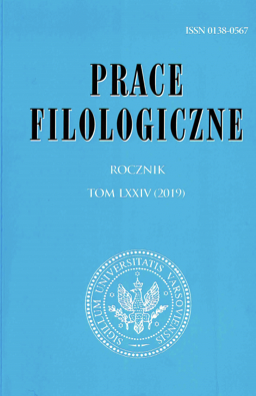O wpływach języka rosyjskiego na mówioną polszczyznę północnokresową dawniej i dziś
The Influence of the Russian Language on Spoken Northern Borderland Polish in the Past and Nowadays
Author(s): Iryda Grek-PabisowaSubject(s): Language studies
Published by: Wydział Polonistyki Uniwersytetu Warszawskiego
Keywords: northern borderland Polishlanguage; spoken language; borrowings; Russianism
Summary/Abstract: The base of the presented research results is the Glossary of the spoken northern borderland Polish language, comprising over 11,000 entries. The northern borderland language is a regional variation of the Polish language. It has been shaping on the former lands of the Kingdom of Poland since mid-17th century (The Union of Lublin, or Unia Lubelska of 1569) on ethnically Belarusian and Lithuanian lands. Over the centuries, it had been borrowing from the local languages of the area and became a language of borrowers for native speakers. At the end of the 18th century, in three partitions (1772, 1792, 1795) Poland was annexed by Russia, Prussia, and Austria. The north-eastern lands of the Kingdom of Poland were taken by Russia. Since then, a strong influence of Russian language on the Polish occupied area has been dated. Despite the efforts of Polish scholars and activists to maintain „purity” and linguistic correctness, especially avoiding Russianisms, spoken and written Polish was saturated with many borrowings, mainly lexical. After Poland regained its independence in 1918, Russian people egan to give up Russian language, especially redundant administrative, economic, educational, and medical terminology. Since the outbreak of the Second World War and the incorporation of eastern lands formerly belonging to Poland into the USSR (the North-Eastern and South-Eastern Borderlands), the next phase of Russification of the Polish language in this area has occurred. This time it penetrated into the local Polish language via vocabulary associated with communist politics, the social system, nationalized industry and agriculture, and education and healthcare. This new variant of borrowings was taken to be called „Sovietism.” In the currently functioning lexicon of the studied area registered in the period up to 2013, there were 1400 Russian Russicisms, which is 13% of active vocabulary. More than 270 new Russian novelisms appeared in this collection, including several dozen of still used Sovietisms.
Journal: Prace Filologiczne
- Issue Year: 2019
- Issue No: 74
- Page Range: 365-381
- Page Count: 17
- Language: Polish

